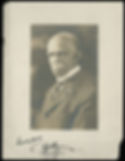ARCHIVISTS WE LOVE: JOHN EDWARD BRUCE: BIBLIOPHILE, COLLECTOR, AND HISTORIAN
- Nomadic Archivists Project
- Nov 7, 2025
- 2 min read

John Edward Bruce (1856–1924), often remembered as a journalist and activist, was also one of the great bibliophiles and collectors of Black history in the early 20th century. Bruce relentlessly gathered books, pamphlets, manuscripts, and fragments of the Black past that others overlooked—or sought to erase. His collecting was not a hobby, nor an indulgence. It was a deliberate act of preservation, driven by the conviction that the written word could safeguard Black achievement, culture and memory at a time when such histories were routinely suppressed.
From his early years as a writer, Bruce built an extensive personal library that spanned African American literature, African history, and accounts of the African diaspora. He exchanged books and papers with scholars, activists, and fellow collectors, creating networks that not only sustained his own collection as his shelves became less a private refuge and more a communal resource, a place where knowledge was not hoarded but circulated, fueling the growth of Black intellectual life. Bruce’s work as a bibliophile made him a trusted source for rare documents and an advisor to others who sought to recover and study Black history.
In 1911, Bruce, together with Arthur A. Schomburg, co-founded the Negro Society for Historical Research, whose mission, according to its constitution, was “to instruct the race and to inspire love and veneration for its men and women of mark.”This pioneering organization created a space for scholars and community members to gather, share resources, and promote research into African and African American life. The Society was dedicated to challenging misrepresentations of Black people in history and highlighting their achievements across the globe. It was also an incubator for ideas and collections that would later fuel institutions like the Schomburg Center for Research in Black Culture.
We love him because:
To understand Bruce’s legacy is to understand the power of collecting as resistance. Every book he saved, every manuscript he preserved, was a defiance of the silences imposed by racism. His vision positioned bibliophiles and private collectors not at the margins of history-making but at its heart. Bruce’s life reminds us that the archive begins not in the vaults of grand institutions but in the care and determination of individuals who refuse to let memory be lost.
References/Links:
John Edward Bruce papers, 1872-1927, Schomburg Center for Research in Black Culture
The Black Sleuth by John Edward Bruce